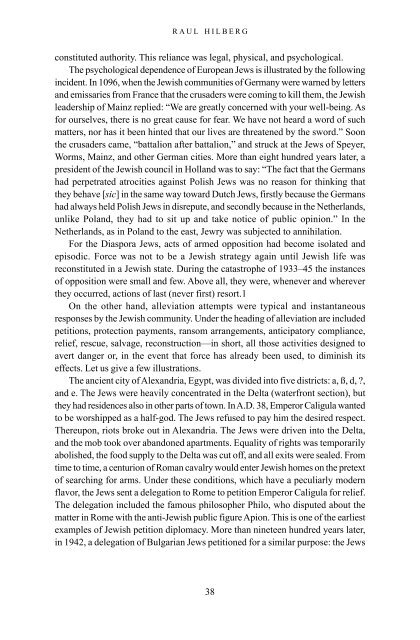The_Holokaust_-_origins,_implementation,_aftermath
The_Holokaust_-_origins,_implementation,_aftermath
The_Holokaust_-_origins,_implementation,_aftermath
Create successful ePaper yourself
Turn your PDF publications into a flip-book with our unique Google optimized e-Paper software.
RAUL HILBERG<br />
constituted authority. This reliance was legal, physical, and psychological.<br />
<strong>The</strong> psychological dependence of European Jews is illustrated by the following<br />
incident. In 1096, when the Jewish communities of Germany were warned by letters<br />
and emissaries from France that the crusaders were coming to kill them, the Jewish<br />
leadership of Mainz replied: “We are greatly concerned with your well-being. As<br />
for ourselves, there is no great cause for fear. We have not heard a word of such<br />
matters, nor has it been hinted that our lives are threatened by the sword.” Soon<br />
the crusaders came, “battalion after battalion,” and struck at the Jews of Speyer,<br />
Worms, Mainz, and other German cities. More than eight hundred years later, a<br />
president of the Jewish council in Holland was to say: “<strong>The</strong> fact that the Germans<br />
had perpetrated atrocities against Polish Jews was no reason for thinking that<br />
they behave [sic] in the same way toward Dutch Jews, firstly because the Germans<br />
had always held Polish Jews in disrepute, and secondly because in the Netherlands,<br />
unlike Poland, they had to sit up and take notice of public opinion.” In the<br />
Netherlands, as in Poland to the east, Jewry was subjected to annihilation.<br />
For the Diaspora Jews, acts of armed opposition had become isolated and<br />
episodic. Force was not to be a Jewish strategy again until Jewish life was<br />
reconstituted in a Jewish state. During the catastrophe of 1933–45 the instances<br />
of opposition were small and few. Above all, they were, whenever and wherever<br />
they occurred, actions of last (never first) resort.1<br />
On the other hand, alleviation attempts were typical and instantaneous<br />
responses by the Jewish community. Under the heading of alleviation are included<br />
petitions, protection payments, ransom arrangements, anticipatory compliance,<br />
relief, rescue, salvage, reconstruction—in short, all those activities designed to<br />
avert danger or, in the event that force has already been used, to diminish its<br />
effects. Let us give a few illustrations.<br />
<strong>The</strong> ancient city of Alexandria, Egypt, was divided into five districts: a, ß, d, ,<br />
and e. <strong>The</strong> Jews were heavily concentrated in the Delta (waterfront section), but<br />
they had residences also in other parts of town. In A.D. 38, Emperor Caligula wanted<br />
to be worshipped as a half-god. <strong>The</strong> Jews refused to pay him the desired respect.<br />
<strong>The</strong>reupon, riots broke out in Alexandria. <strong>The</strong> Jews were driven into the Delta,<br />
and the mob took over abandoned apartments. Equality of rights was temporarily<br />
abolished, the food supply to the Delta was cut off, and all exits were sealed. From<br />
time to time, a centurion of Roman cavalry would enter Jewish homes on the pretext<br />
of searching for arms. Under these conditions, which have a peculiarly modern<br />
flavor, the Jews sent a delegation to Rome to petition Emperor Caligula for relief.<br />
<strong>The</strong> delegation included the famous philosopher Philo, who disputed about the<br />
matter in Rome with the anti-Jewish public figure Apion. This is one of the earliest<br />
examples of Jewish petition diplomacy. More than nineteen hundred years later,<br />
in 1942, a delegation of Bulgarian Jews petitioned for a similar purpose: the Jews<br />
38



